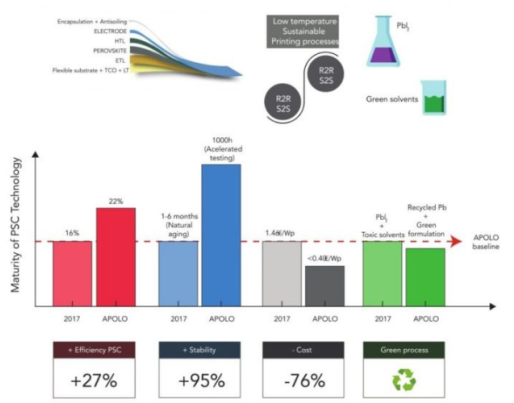APOLO project

APOLO project
APOLO consortium will work on advanced materials, from cell to encapsulant to develop flexible and stable Perovskite solar cells (PSC) using scalable and low cost processes, reducing amount of toxic materials tackle the challenges to provide market niches solutions
Perovskite solar cells (PSC) have shown an impressive learning curve in the last decades in comparison with 1st, 2nd and initial 3rd generation solar cells (such as Dye Sensitized Solar Cell (DSSC) and Organic Photovoltaic (OPV)). Since the very beginning, the main market demands for 3rd generation Photovoltaics (PV) were more flexibility and more colour choices.
Both of these ideal properties lead to new business opportunities in Building Integrated Photovoltaics (BIPV), electronic consumer goods, textiles, etc. These technologies also have low cost using fully printing process, low temperature processes and out of clean rooms which reduce the production cost. The most important problem in PSC technology is the short lifetime which is currently the main barrier for the marketability of PSC.
Up to now all the developed PSC used cheap materials and/or solution which did not exhibit high efficiencies. In contrast high efficiency PSCs usually require relatively expensive materials and vacuum deposition process. PSC toxicity is considered to be negligible since the amount of lead in perovskite layer is not so relevant if it is compared against Silicium technology, nevertheless, the solvent toxicity should be taken in account in order to benefit industrialization of PSC products.
APOLO consortium will surpass the aforementioned barriers for market deployment by providing flexible and stable PSCs using scalable and low cost processes, reducing amount of toxic materials tackle the challenges to provide market niches solutions. APOLO developments will ensure to enhance the Technology Readiness Levels (TRL) of PSC technology.
APOLO consortium will work on advanced materials, from cell to encapsulant to develop flexible PSC, fully printable, with efficiency of 22% with at least 80% of initial performance after relevant accelerated test from standards.
APOLO solutions will allow the development of a totally new product by integrating the modules into the architecture design of buildings. New applications of this technology open doors to other markets apart from BIPV, such as automotive, textile, etc.
Partners
- ACONDICIONAMIENTO TARRASENSE ASSOCIACION
- UNIVERSITA DEGLI STUDI DI ROMA TOR VERGATA
- COMMISSARIAT A L ENERGIE ATOMIQUE ET AUX ENERGIES ALTERNATIVES
- FRAUNHOFER GESELLSCHAFT ZUR FORDERUNG DER ANGEWANDTEN FORSCHUNG EV
- UNINOVA-INSTITUTO DE DESENVOLVIMENTO DE NOVAS TECNOLOGIAS-ASSOCIACAO
- ECOLE POLYTECHNIQUE FEDERALE DE LAUSANNE
- ARKEMA FRANCE SA
- ACCUREC-RECYCLING GMBH
- GREATCELL SOLAR ITALIA SOCIETA' A RESPONSABILITA' LIMITATA
- FLEXBRICK SL
- PRODUCTION TRADE AND SUPPORT OF MACHINABLE PRODUCTS OF SOFTWARE AND INFORMATICS - RELATIONAL TECHNOLOGY AE
- CAMBRIDGE NANOMATERIALS TECHNOLOGY LTD
Start date: 1 April 2018 - End date: 31 July 2022
This project has received funding from the European Union’s Horizon 2020 research and innovation programme under grant agreement No. 763989.
